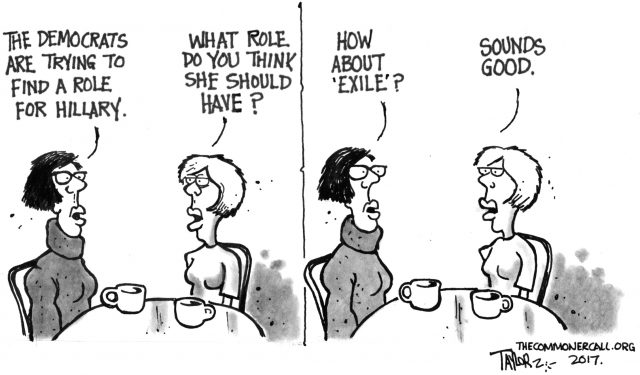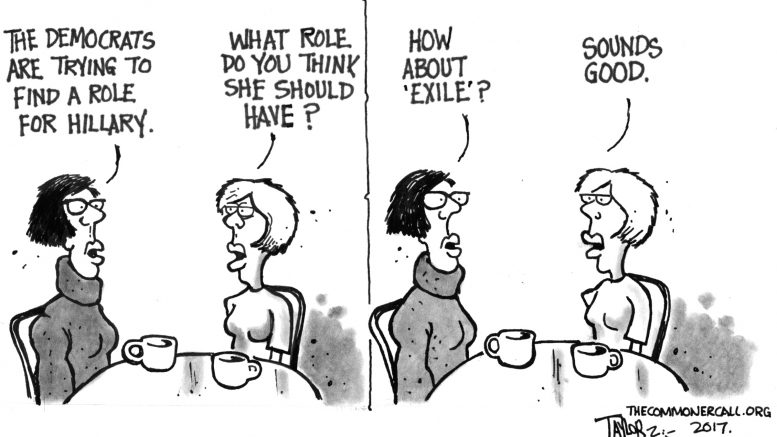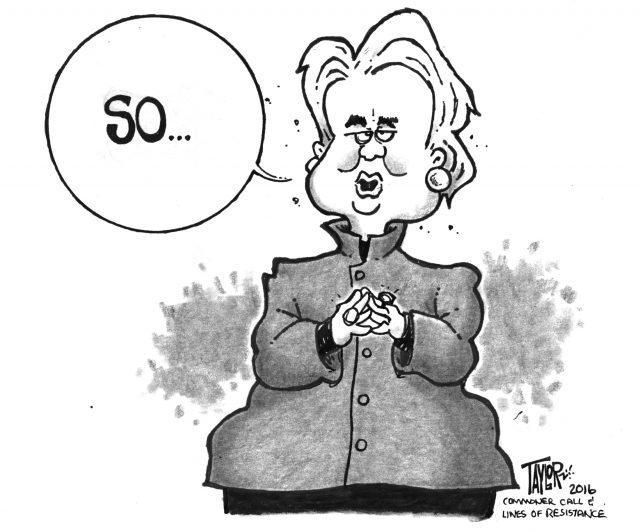
By Matt Taibbi
Rolling Stone (4/21/17)
There is a critical scene in Shattered, the new behind-the-scenes campaign diary by Jonathan Allen and Amie Parnes, in which staffers in the Hillary Clinton campaign begin to bicker with one another.
At the end of Chapter One, which is entirely about that campaign’s exhausting and fruitless search for a plausible explanation for why Hillary was running, writers Allen and Parnes talk about the infighting problem.
“All of the jockeying might have been all right, but for a root problem that confounded everyone on the campaign and outside it,” they wrote. “Hillary had been running for president for almost a decade and still didn’t really have a rationale.”
Stumped for months by how to explain why their candidate wanted to be president, Clinton staffers began toying with the idea of seeing how “Because it’s her turn” might fly as a public rallying cry.
Allen and Parnes here quoted a Clinton aide who jokingly summed up Clinton’s real motivation:
“I would have had a reason for running,” one of her top aides said, “or I wouldn’t have run.”
The beleaguered Clinton staff spent the better part of two years trying to roll this insane tautology – “I have a reason for running because no one runs without a reason” – into the White House. It was a Beltway take on the classic Descartes formulation: “I seek re-election, therefore I am… seeking re-election.”
If you’re wondering what might be the point of rehashing this now, the responsibility for opposing Donald Trump going forward still rests with the (mostly anonymous) voices described in this book.
What Allen and Parnes captured in Shattered was a far more revealing portrait of the Democratic Party intelligentsia than, say, the WikiLeaks dumps. And while the book is profoundly unflattering to Hillary Clinton, the problem it describes really has nothing to do with Secretary Clinton.
The real protagonist of this book is a Washington political establishment that has lost the ability to explain itself or its motives to people outside the Beltway.
In fact, it shines through in the book that the voters’ need to understand why this or that person is running for office is viewed in Washington as little more than an annoying problem.
In the Clinton run, that problem became such a millstone around the neck of the campaign that staffers began to flirt with the idea of sharing the uninspiring truth with voters. Stumped for months by how to explain why their candidate wanted to be president, Clinton staffers began toying with the idea of seeing how “Because it’s her turn” might fly as a public rallying cry. …
*****
The Deification Of Hillary Clinton: New Book Asks Us To Accept A Version Of Clinton That Doesn’t Exist
By Sarah Jones
The New Republic (4/5/17)
Susan Bordo is right about one thing: Sexism is real and Hillary Clinton has been subjected to it. The spectre of Hillary-the-nasty-woman is persistent and familiar—but it’s only one of the many reasons Clinton lost her latest White House bid. The story of her defeat is a complicated one, encompassing rising anti-establishment fervor, campaign error, and yes, prejudice. But you wouldn’t know it from reading Bordo’s new book.
In The Destruction of Hillary Clinton, the feminist scholar seeks to absolve Clinton for her loss to Donald Trump. To do so, she presents a raft of justifications: James Comey, Wikileaks, conservatives, Bernie Sanders, and dumb young people. There is scarcely a mention of policy positions Clinton took during her campaign that were less than inspiring, or of moments when the candidate seemed to misread the public mood—such as her repeated claim that “America is already great.” Any rational analysis of Clinton’s career and campaigns must include an examination of her mistakes, but Destruction is not rational. Bordo starts from the conviction that Hillary Clinton, as “the most qualified candidate in history,” should have won. Clinton’s actions interest her less than what she deems as Clinton’s greatness. It’s not an investigation but a deification.
‘Destruction’ offers no real lessons for Democrats. It’s a hagiography, written to soothe a smarting party. That is precisely why they must ignore it: There is no path forward that does not account for past mistakes.
This is personal for Bordo, who admits as much in her introduction. Clinton reminds her of the subject of one of her previous books, Anne Boleyn—another woman she sees as a victim of “nasty caricature,” “factually loose biographies,” and “sensationalization.” Bordo herself and Hillary Clinton are also a bit alike, she tells us. They share a “generational” bond and faced similar decisions about their professional lives as women. This observation has merit, but Bordo weights it more heavily than it deserves. She takes Clinton’s suffering on herself.
“This book is hard to write as it requires revisiting events that caused me pain, anger, and frustration,” she writes, adding that though some may mock her for calling her feelings “trauma,” she spent 2016 “in a state of perpetual fury and helplessness.” She adds, “I often found myself waking up way too early, then falling asleep at unexpected times, not because I was sleepy but because consciousness felt like a burden.” Recall that this is a book about a politician, not a memoir of post-traumatic stress or bereavement.
Exercise in public relations
In fact, Destruction reads more like an exercise in public relations. Clinton is not a representative of the “establishment,” Bordo argues, but has consistently been a progressive. If conservatives hadn’t vilified her in the ’90s—if Bernie Sanders hadn’t run against her—she would have defeated Donald Trump.
It’s a fragile argument that relies heavily on scapegoats. …
*****
Hillary Clinton’s Forthcoming Book Will Focus On Misogyny’s Role In The Election
By Jenavieve Hatch
The Huffington Post (4/6/17)
NEW YORK ― In her first sit-down interview since the presidential election at Tina Brown’s Women in the World Summit, Hillary Clinton told New York Times columnist Nicholas Kristof about the plans she has for her forthcoming book.
Kristof asked Clinton how she felt about the role that misogyny played in the election ― especially considering that a majority of white women voters for President Trump, regardless of his admitted sexual assault, allegations of abuse, and comments he’s made about women.
“Im currently writing a book where I spend a lot of time wrestling with this,” Clinton said.
She continued:
As you might guess, I’ve thought about it more than once. I don’t know that there is one answer. It is fair to say that certainly misogyny played a role. That just has to be admitted.
What the underlying reasons were, I’m trying to parse out myself. There is a constant struggle in a time of rapid change, like one we are living through, between something that is different, that may hold out even possible positive consequences, and something that is familiar and really is first and foremost about security of what you have right now. In this election, there was a very real struggle between what is viewed as change that is welcomed and exciting to so many Americans and change which is worrisome and threatening to so many others.
And you layer on the first woman president over all of that change, and some people, women included, had very real problems.
During the Q&A, Kristoff also asked who Clinton considers to be at blame for her shocking loss.
“How much time do we have?” she responded. “You’ll have to interview me after my book comes out.” …
*****
The Only Alernative: Living Life As If Change Is Possible
“One only needs to look at how the Democratic Party and the mainstream media stacked the deck against Bernie Sanders to realize that the system is still so deeply entrenched as to seem invulnerable, unassailable, impervious to change or improvement, let along being dismantled. But what do you do with that conclusion? Jump off a bridge? Drink yourself under the table? I prefer to take satisfaction in the things progressives and leftists have accomplished since I was a young man. To live my life as if real change is possible.”
– W.D. Ehrhart, “Vietnam and the Sixties”, Monthly Review, December 2016 (p. 42).
(Commoner Call cartoons by Mark L. taylor, 2017. Open source and free to use with link to www.thecommonercall.org )


